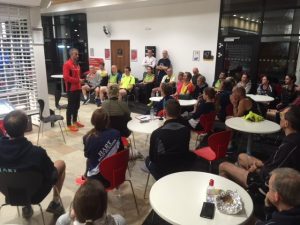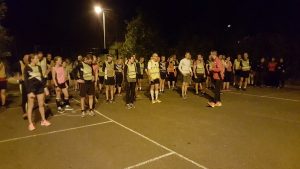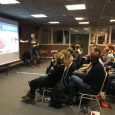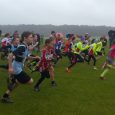Last Tuesday night, the club undertook the second of Nick Anderson’s coaching sessions as part of the England Athletics Club Run initiative. This was an excellent interval session based on running at threshold and above threshold. The aim of the session was to improve running economy by spending longer running at the top end of threshold pace. Nick introduced four new low impact warm up routines and conducted a very informative Q&A session after training. We were also joined by Sarah Gardiner, our area Club Support Manager from England Athletics. Sarah ran in the session and was very impressed with our athletes and club. Sarah made special mention of our superb website and said that she would be directing other club’s to it.
For those who didn’t make the Nick Anderson Q&A here is a summary. Many thanks to Dominic Wake for taking the notes.
Q. Warm-up more than just jogging?
A. There can be great impact in hop, skip and bounding warm ups. This could tear muscles. (Nick introduced four new low impact warm-up routines during his coaching session)
Recommends the warm ups we did tonight as they were low impact e.g. skips were small movements
Q. How not to over train?
You can run a good marathon time on three runs per week. Look at recovery before look at training. If tight before every run, run easy. Tips
– Sleep well 7-8 hours
– Check for over-training – Take resting heart rate every day to establish. A day after a hard session it will be higher and do less. It should come down over weeks rather than go up
– Nutrition needs to be good. Also, eat properly to avoid temptation not to go out
– Train consistently for months
Recovery runs should be at a speed its easy to have a conversation. Run at 60% maximum heart rate. Good athletes are good at running slowly
Q. How to fuel a long, evening run?
A. Get as many food types into every meal: carbs, protein, vitamins and minerals.
Have varied meals.
Snacking is good because it keeps the metabolism going. Long periods of not eating means body wants to store more as fat, so it’s not available for training.
Have a good breakfast: wholegrain bread and cereals
Mid morning snack: half a bagel; fruit; nuts (carbs/protein)
Lunch: healthy
Mid afternoon: complex carbs like toast, banana, bagel that are easy to digest (not proteins or higher fat)
On long run, take gels as you would anyway (every 40 mins – 1 hour)
Q. How hard to cross-train?
Cross training on recovery day should be at the recovery day heart rate @ 60% of max
A. Should we do pre-breakfast runs
Q. Yes they are very important in training the body to utilise fat as well as glycogen – important in marathon training. They also deplete glycogen stores, conditioning the body to store as much as possible
– Do at least one per week
– Ensure you re-fuel as soon as you return
So we now look forward to Nick’s last session on Thursday 9th November which will involve hills!





